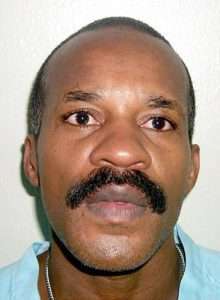Walter Mickens was executed by the State of Virginia for the murder of Timothy Hall
According to court documents Walter Mickens, who was a convicted sex offender, would lure Timothy Hall into an abandoned building where he was sexually assaulted and stabbed more than one hundred and forty times
Walter Mickens would be arrested, convicted and sentenced to death
Walter Mickens would be executed by lethal injection on June 12 2002
Walter Mickens Photos

Walter Mickens FAQ
When Was Walter Mickens Executed
Walter Mickens was executed on June 12 2002
Walter Mickens Case
Walter Mickens Jr. was executed tonight by injection, a punishment that came a decade after he sexually assaulted a Newport News teenager, stabbed him 143 times and left him to die on a dirty mattress. His death marked the end of one of Virginia’s most divisive capital cases and one that split the U.S. Supreme Court 5 to 4. The execution also brought Gov. Mark R. Warner (D) his first clemency request — one that he struggled with for days before rejecting.
Mickens, 47, who had been on Virginia’s death row longer than any other inmate, entered the death house at Greensville Correctional Center at 8:52 p.m. as family members of Timothy Jason Hall watched tearfully from behind a window. He died 14 minutes later. “To whoever I may have hurt or caused harm, I pray that you can forgive me,” Mickens said just before his execution. He also invoked God’s name and said he forgave “Governor Warner for his decision.” Mickens’s mother, father, sister and brother visited him on his final day.
Over the past decade, the case slowly worked its way through the judicial system, coming before five courts and two juries. The U.S. Supreme Court in March denied Mickens’s final bid for a new trial by one vote, rejecting his claim that his conviction was tainted because his court-appointed lawyer represented Hall at the time of the murder. “If your life was on the line, would you want the attorney representing you to have represented the victim?” Mickens’s appellate attorney, Robert Wagner, said after the execution. “Is that fairness? The system failed Walter Mickens in this case.” The high court’s ruling left Mickens’s fate in Warner’s hands. The governor’s aides said Warner struggled with the decision throughout the day and was still seeking information this afternoon. Ultimately, Warner noted the courts’ agreement on the punishment and declined to intervene.
A man walking along the James River in Newport News on March 30, 1992, found Hall’s body by an abandoned building. The 17-year-old was unclothed from the waist down except for athletic socks with orange stripes. A medical examiner found that 25 of his wounds would have been fatal but that Hall probably lived for more than a half-hour after the attack. Mickens’s DNA matched that in semen found at the scene, and he allegedly confessed to the crime to an investigator and fellow inmate. “I lose my ability to rationalize when I think about the first wound, the screaming, the pain, the fear, the hurt and unknowing that my brother went through,” Hall’s sister, Laura Hare, wrote in a letter she sent to Warner along with a photo of her brother. “Please tap a pen 143 times and imagine what must have been involved with stabbing someone 143 times.”
Mickens, who had two sodomy convictions in the 1970s, was convicted of capital murder and attempted forcible sodomy in 1993. Two juries considered his punishment, and both recommended the death penalty.
But in recent days, Mickens’s attorneys renewed arguments that their client’s defense was flawed from the moment it began because trial lawyer Bryan Saunders was representing Hall on an assault charge. “The execution of Mr. Mickens under these circumstances would be a travesty of justice,” Wagner and attorney Robert E. Lee, wrote in a 13-page petition for clemency. Mickens’s case, they said, is “exactly the situation for which the ‘safety valve’ of clemency was intended.”
Warner regarded the clemency decision as an “ominous power,” his spokeswoman Ellen Qualls said. The governor continues to have “a real concern” about whether Mickens received fair representation but also considered the horror of the crime, she said. In her letter to Warner, Hare said her brother had survived a troubled childhood and was struggling to make it on his own. The morning of his death, she recalled, he stopped at her home. “I managed to tell him that he needed to get his life together, and he told me that I was right, and that one day I would be proud of him,” Hare wrote. “He left trying to prepare himself to live in this world, he left not knowing that he was about to meet the most cruel person.”
http://www.washingtonpost.com/wp-dyn/articles/A41771-2002Jun12.html







